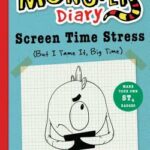What to do about all the young people on their phones, growing depressed, anxious…and worse?
Well, there’s an ancient plaything kids have loved forever (literally). It keeps them occupied for hours and can actually hold its own against TikTok.
It’s called “the world.”
Screen-Free Week is the perfect time to make an introduction: Kids, World. World, Kids.
Liberate the kids
If we liberate our children from all the time they’re spending online — if we give them back some free time and free play — they’ll have an alluring alternative to the couch. But without much chance to hang out with their friends in real life, unsupervised, the only place they can have fun and socialize freely is online.
That’s bad. My colleague and Let Grow co-founder Jonathan Haidt has chilling graphs that show childhood mental health problems, and, I hate to write it, suicide spiking since 2012 – the year the smart phone became ubiquitous, even in the hands of teens and tweens.
The only way to get kids off social media is to come up with an alternative that’s even MORE fun. Fortunately, that’s what play and exploration ARE…when kids get to do them.
Playing is what we’re meant to do
It may feel like kids prefer the virtual world to the real one. But when a 2010 survey by IKEA asked them whether they prefer playing with friends or playing online, 89% chose playing with friends. And they were online when they took the survey! Playing outside was their favorite activity of all.
Playing is what all young mammals come pre-programmed to do. While I, too, am currently addicted to my phone, I of course didn’t have one as a kid, which means that a lot of my free time was truly free – to ride my bike, play with friends, read, draw, spend time in the woods. Classic. It wasn’t that interesting – except to me.
Because without a wildly attention-grabbing movie theater/game device/popularity meter in my pocket, I had to engage with whatever else there was: friends, fun, nature, boredom.
How do we fight back?
But in the past generation or two, as children’s free time and “independent moibility” (getting around on their own) have declined, kids have been in decline, too. This started happening long before the invent of the smart phone, but it sped everything up, and social media seems like the most corrosive part of that change. How to fight back?
1. We have to start renormalizing kids out and about on their own. Otherwise, the only world left for them to explore is online. In keeping kids “safe” from strangers, traffic, bugs, and bullies, we’ve kept them UN-safe from anxiety, depression, and suicide.
2. We should also work to popularize programs like ”Wait Until 8th,” where parents jointly agree to wait til their kids reach 8th grade before giving them a phone.
3. We suggest you ask your school to start a Let Grow Play Club. It’s so simple! The school stays open for mixed-age, no-devices, free play after school. There’s an adult (or teen) in the corner with an Epi pen. But other than that, it’s old-fashioned fun. The kids organize the games. They solve the spats. They figure out stuff kids have always figured out, like how to deal with a cheater, or a little brother who keeps running onto the field. Kids become engaged and confident when they get to do things like that. Real things.
And as one 4th grader told me when I asked whether he prefered playing in real life or online: “You can make friends online, but when you take the headphones off, there’s no one there.” Added his friend, “I like real life.”
Kids are desperate to play and be together. If the only place we allow them to do that is online, that’s where they will go.
Give them back the real world – without adults constantly supervising, organizing, and “helping” — and you just may have to clang a cowbell to get them to come in for dinner.
Let freedom ring.
Skenazy is president of Let Grow, a nonprofit promoting childhood independence and resilience, and founder of the Free-Range Kids movement.




 Climb On!
Climb On! Peacock and Sketch
Peacock and Sketch Connor Crowe Can’t Let Go
Connor Crowe Can’t Let Go Treasure Hunt
Treasure Hunt Timmy’s Monster Diary: Screen Time Stress (But I Tame It, Big Time)
Timmy’s Monster Diary: Screen Time Stress (But I Tame It, Big Time)
